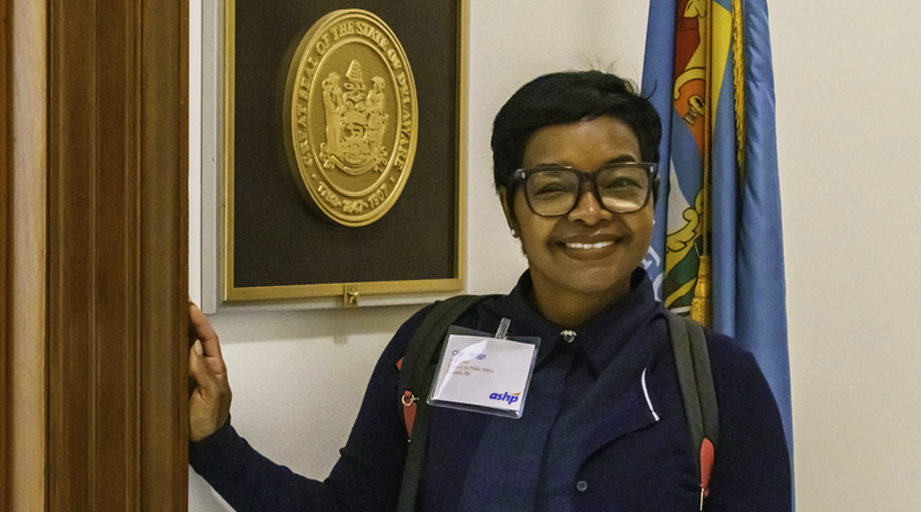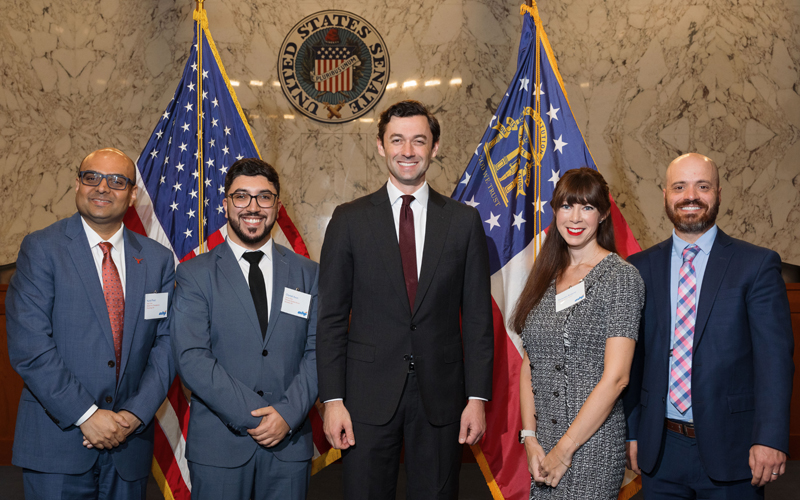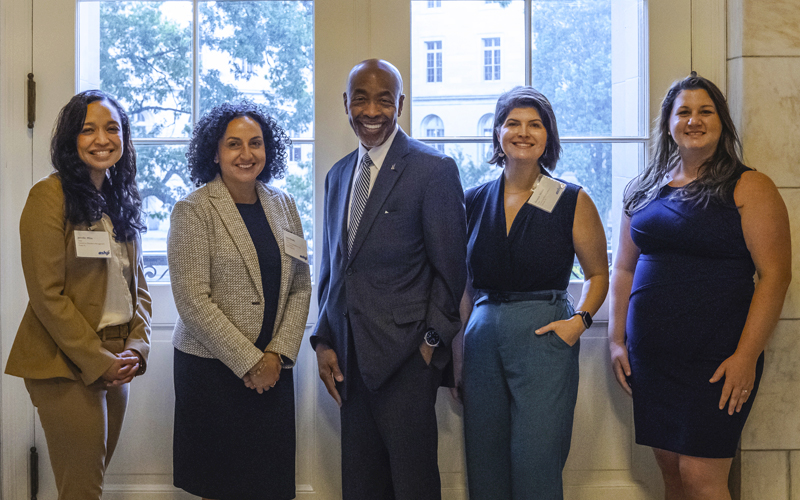
Nearly 140 ASHP members visited Capitol Hill Wednesday, making the case for reforms by describing the impacts on patients back home — from expanded medication access in rural Georgia, to pharmacist-run clinics that help Delaware patients avoid emergency rooms, to drug preparation standards that protect Florida cancer patients.
ASHP’s annual Legislative Day, a signature part of Policy Week, provides an opportunity for members of the five policy-making councils and the Commission on Affiliate Relations to speak with members of Congress about the profession’s top issues, which include provider status, restrictions on the 340B Drug Pricing Program, site-neutral payment cuts, threats to residency funding, and drug shortages.
Advocating on issues important to their patients is part of “fulfilling our oath as pharmacists to improve the health of all our patients,” said Cheri Briggs, vice chair of the Council on Public Policy. “It’s a lifelong commitment, and this is your opportunity.”
On a wet morning in the nation’s capital, members gathered first at the Monocle, a historic restaurant near the Capitol, for breakfast and comments from Rep. Adrian Smith of Nebraska, a co-sponsor of ASHP-priority legislation, Equitable Community Access to Pharmacist Services (ECAPS) Act.
Smith noted that in rural areas, including the ones in his district, seniors need pharmacists to provide such services as vaccination. He added that he was excited about the bipartisan support for ECAPS.
“You are trained in many ways to know what’s best for patients,” Smith said.
ASHP President Leigh A. Briscoe-Dwyer urged members to share patients’ stories with congressional staffers to drive home the impact of pharmacists' role as patient care providers.
“Let’s see what a difference a day makes!” she said as members prepared to fan out across Capitol Hill for their scheduled meetings.

Georgia members first visited Sen. Jon Ossoff’s office, where he was hosting an all-issues meeting with dozens of constituents. After Ossoff fielded questions on transportation and agriculture, Davey Legendre, a member of ASHP’s Council on Pharmacy Management, raised his hand.
He expressed concerns about drug manufacturers’ continued restrictions on the 340B program, pointing out that savings from the program were particularly important for expanding access in rural areas of Georgia. “What can we do to help?” said Legendre, vice president of pharmacy management at PharmD On Demand.
Ossoff said he supports protections to 340B and noted that he often reminds colleagues that the program is not financed by taxpayers. After the meeting, ASHP members said they were encouraged by Ossoff’s comments. Charbel Aoun, chair of the ASHP Student Forum and a fourth-year student at Philadelphia College of Osteopathic Medicine Georgia School of Pharmacy in Georgia, said the interaction with the senator showed why in-person advocacy is so important.
And that goes for students, too.
“If we’re not proactive as students, we can’t serve as the pharmacists we hope to be,” said Aoun.
Meanwhile, Briggs, a senior pharmacy director at Bayhealth in Delaware, met with a staff member from Sen. Chris Coons’ office.
Briggs discussed the need to protect pharmacy residency funding. She pointed to one potential impact of having fewer residency-trained pharmacists in Delaware: less manpower to run anticoagulation and diabetes clinics that help keep patients out of emergency rooms. Briggs also described how pharmacists trained in pain management in her health system are helping shepherd patients with substance use disorder into treatment.
“We’d like your help in safeguarding that,” Briggs said of residency programs.

In a meeting with a staff member in Sen. Marco Rubio’s office, the Florida delegation discussed 340B, residency funding, and so-called site-neutral proposals, which would reduce payments for drug administration in hospital outpatient departments.
The Florida team explained that hospital outpatient departments meet higher safety standards for infusion care, describing how hospitals take certain precautions when compounding medications that other locations may not. Rubio’s staff member said she appreciated hearing pharmacy’s perspective on site neutral proposals, which have been a major issue in healthcare legislation this year.
Jennifer Miles, the chair of ASHP’s Council on Pharmacy Management and assistant director of ambulatory care at Jackson Health System in Miami, Florida, said after the meeting that that building relationships with policy makers and their staff is critical to getting important legislation passed. Showing up in their offices and meeting them face-to-face is key.
“This is where the work gets done,” said Miles.








